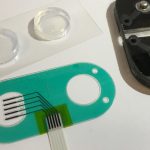 Sweat is an incredibly useful resource for medical research, but whilst it provides us with some invaluable information, it’s also pretty uncomfortable for most of us, especially during our regular working day. Hence it’s something that we usually try and avoid as much as possible.
Sweat is an incredibly useful resource for medical research, but whilst it provides us with some invaluable information, it’s also pretty uncomfortable for most of us, especially during our regular working day. Hence it’s something that we usually try and avoid as much as possible.
Researchers from the University of Cincinnati have come up with an ingenious solution however that stimulates sweat glands in a small patch of skin, thus generating the sweat required to gather the information, without causing us to overheat.
The project, which was documented in a recent paper, uses a device around the same size as a Band-Aid. The device uses a chemical stimulant to produce sweat, even if we’re relaxing on the sofa. In addition to analyzing the sweat produced, the device also analyzes the amount of sweat, thus providing crucial insights into the hormones or chemicals the biosensors measure.
“The challenge is not only coming up with new technological breakthroughs like this, but also bringing all these technology solutions together in a reliable and manufacturable device,” the team say.
Bringing it to market
To do this, the team created a biosensor company, called Eccrine Systems, Inc. The company, which was forged in the Technology Accelerator program run by the university, aims to fundamentally change the way health is monitored and diagnosed.
“Doctors would love to know if chemical concentrations are increasing or decreasing over time,” they say. “What was your baseline before you got sick? Then by measuring the change in concentrations, we know even more about how sick you are or how quickly you are getting better.”
Sweat is great in that it provides an alternative to invasive testing methods that dominate today. It has traditionally been overlooked as it’s not something that can be relied upon. Being able to stimulate it upon demand therefore, could be hugely valuable.
The team believe that the research represents a big leap forward in the ability to derive meaningful insights from sweat. They believe it opens up a wide range of possibilities. For instance, you might be able to monitor cardiac patients once they’ve been released from hospital, or monitor people for signs of dehydration. It might even be used to help ensure medicine dosages are appropriate.
“The end goal is to take the idea from a benchtop test to a portable device — perhaps for people in high-stress jobs like airline pilots — and analyze them for stress,” the authors say. “If you’re a pilot, you can’t do blood draws while you’re flying the plane. But a sensor could analyze sweat so we can begin to understand how their body responds to stressful situations.”